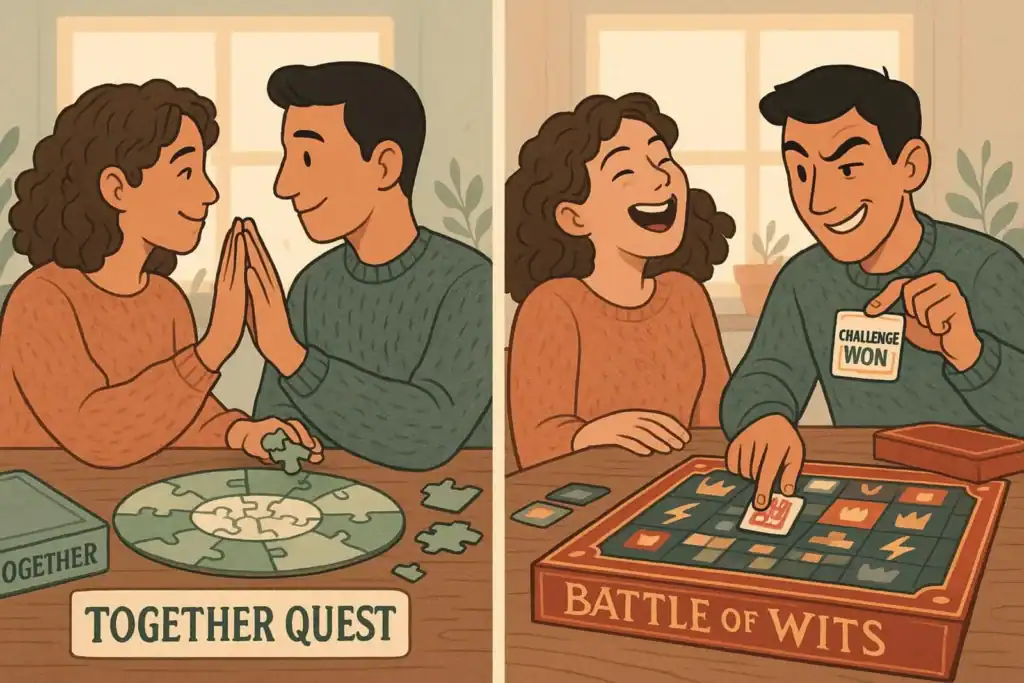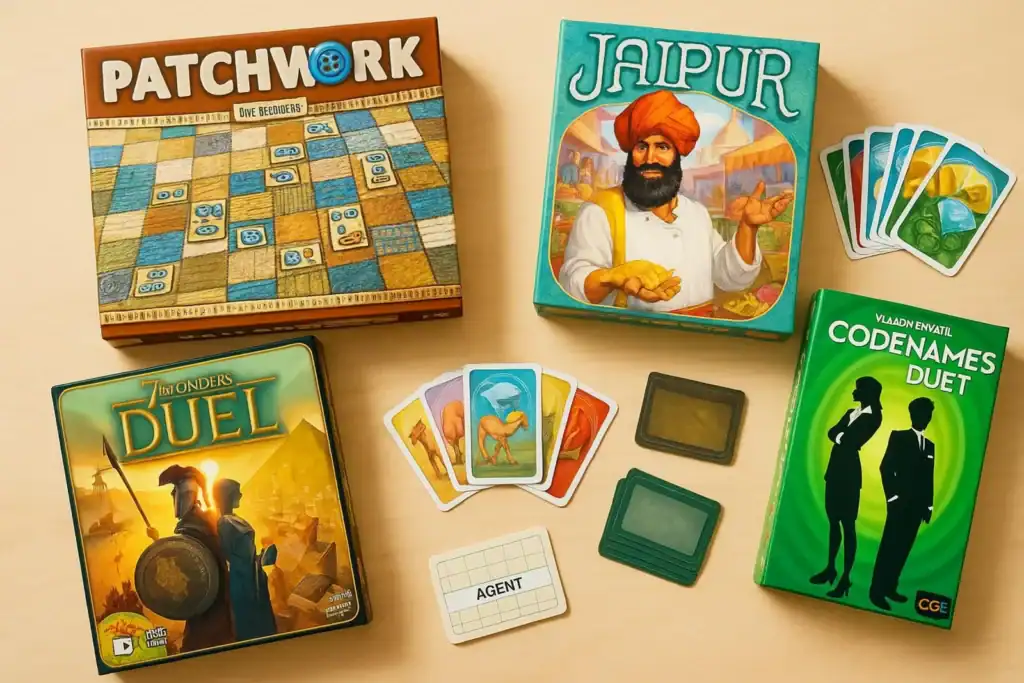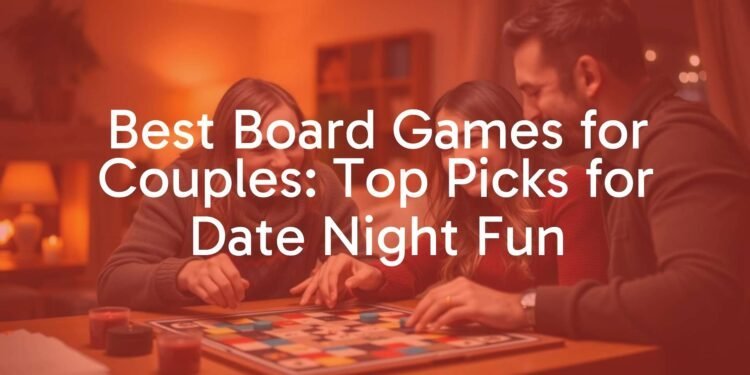Finding the best board games for couples means more than grabbing any two-player box. You want games that build connection, spark joy, and add a bit of friendly rivalry. The right choice can turn a regular evening into a memorable date night, encouraging conversation, planning, and shared laughs. Whether you’re a new couple finding common interests or long-time partners looking for new ways to spend time together, a good game can help you grow closer and create lasting memories.

What makes a board game great for couples?
Picking a game for two is about more than the rules. You want something that fits your style as a pair and matches what you both enjoy, so each play feels fun and meaningful.
Benefits of playing board games as a couple
Playing together brings many perks. Beyond entertainment, games give you a simple way to build skills that help your relationship. You’ll talk through ideas, swap clues, and share how you think. This is especially true in co-op games, where winning relies on teamwork and reading each other well.
Games also help reduce stress. After a long day, sitting down to play can help you unwind, shift your focus, and enjoy each other’s company. They give you a safe space to solve problems, make choices, and handle small disagreements-useful skills for any partnership. Beating a tough puzzle or cheering a win together can deepen your bond and add to your shared stories.
Features to look for in couples’ board games
When hunting for a great two-player game, watch for these points:
- Built for two: Games made for two often feel balanced and smooth.
- Clear rules: Short, simple rulebooks help you jump in fast.
- Readable pieces: High contrast, large text, and clear icons help in low light.
- Durable bits: Sturdy cards and tokens handle snacks and drinks better.
- Small footprint: Compact games are easy to pack for a night out or a trip.
Choosing cooperative vs. competitive gameplay
A big choice for couples is co-op or competitive play. Co-op games put you on the same side. You talk, plan, and win together, which builds a strong team feeling.
Competitive games add playful head-to-head energy. If you enjoy gentle trash talk and clever moves, this style can be a blast. Keep the mood light so the contest stays fun. Some pairs prefer to mix both styles, so game night fits whatever mood you’re in.

Game length and session preferences
Think about how much time you have. For a casual date-at a cafe or before dinner-30-60 minutes is great. Shorter games let you play a couple of rounds without dragging on. Titles like Love Letter or The Fox in the Forest fit well here.
Planning an at-home evening with snacks and drinks? A longer game with deeper strategy can be a nice change of pace. Pick something that matches your energy so the night feels relaxed, not rushed.
Different types of board games for couples
Board games cover many styles, so you can find a fit for any mood. From brainy showdowns to light co-op puzzles, exploring a few types will help you pick the right vibe for your next date night.
Cooperative board games for teamwork
Co-op games are great if you like working together toward a shared goal. They encourage conversation, joint planning, and a team mindset as you face the game’s challenges.
Codenames Duet is a strong pick: you and your partner give one-word clues to find agents while dodging assassins. The Fox in the Forest Duet offers quiet teamwork that leans on subtle signals and knowing each other’s style. If you want something deeper, Spirit Island lets you combine unique powers to push back invaders. These choices strengthen your bond and highlight the power of working as one.
Competitive board games for friendly rivalry
If you love a little one-on-one tension, go competitive. These games reward clever play, tricky timing, and a bit of nerve. Keep it playful, and focus on a good time over bragging rights.
Jaipur blends trading and timing as you race for “seals of excellence.” Patchwork turns quilt-making into a cozy puzzle with sharp decisions. For pure strategy, Hive brings a chess-like duel with bugs on hex tiles. Expect laughs, banter, and plenty of “one more game.”
Romantic and relationship-themed board games
Some games lean into romance or relationship stories. They can spark personal chats, tell shared stories, or just set a warm tone. Love Letter is a quick game of luck and deduction about wooing a princess; some couples even play the “Wedding edition” yearly.
Fog of Love goes deeper, letting you build a fictional relationship and make choices that shape a shared story. It can be eye-opening and fun for couples who want a different kind of game night.
Strategy and deduction games
If you enjoy mental challenges, strategy and deduction games offer rich play. They reward planning, foresight, and clever moves against your partner or the system.
7 Wonders Duel packs deep choices into three ages of civilization building, with multiple win paths. Watergate pits a President against a reporter in a tight tug-of-war over a scandal. Hive also fits here as a clean, abstract puzzle. These games suit pairs who like quiet focus and smart, satisfying play.
Light and quick games for short play sessions
Sometimes you want fast and easy. These small games work well during a coffee break, waiting on food, or between larger games. Simple doesn’t mean dull-many are lively and smart.
The Fox in the Forest is a speedy trick-taker with charming art. Love Letter often wraps in under 20 minutes. Dice games like That’s Pretty Clever give everyone something to do on each turn, keeping the pace brisk. These are great for quick sessions and for new players.
How to choose the right board game for your relationship
Picking the right game is part taste, part timing, and part mood. Aim for something you both enjoy, respect each other’s comfort zones, and be open to trying new things. The main goal is to feel closer, not stressed.
Matching game complexity to player experience
A big part of choosing well is matching complexity to both players. If one of you is new and the other has lots of practice, jumping straight into a heavy Eurogame can frustrate the beginner. Start with games that are easy to learn but still reward smart play.
Jaipur is a good example: simple rules with plenty of choices. As you both grow more confident, you can bring in deeper titles. Try to keep both players engaged-no one should feel lost or bored.
Adapting themes to personal interests
Theme matters. A topic you both like makes a game more fun. If you enjoy fantasy, Spirit Island might be a hit. If you like history and politics, try Watergate. Even abstract games can feel warm and cozy, like the quilts in Patchwork or the storybook look of The Fox in the Forest.
Don’t force a theme one of you dislikes unless the gameplay really shines. Trying new themes together can also open new shared interests. There’s a lot to explore, so find what fits your tastes.
Balancing challenge and relaxation
A good couples’ game feels engaging without feeling like work. The right level of challenge changes by couple and by night.
For a calm evening, pick something light with quick turns. If you want a bigger test, go for deeper strategy. Match the game to your energy so you both end the night happy-whether that’s from a clever win or a silly mistake you both laugh about.
Games to avoid: conflict vs. connection
Some games might cause stress. “Take-that” games, where you directly sabotage your partner, can create real frustration if you don’t both treat it lightly. Games with messy or unclear rules can also spark needless arguments.
If a game keeps leading to fights or hurt feelings, put it aside. Even co-op games can cause trouble if one person tries to call all the shots. Notice how a game affects your mood, and choose ones that keep things positive.
Best board games for couples to play together
Now that we’ve covered what makes a good fit, let’s look at specific games that work well for pairs. These picks cover different styles and play times, so you can find something that suits your night.
Codenames Duet
Codenames Duet adapts the hit word game for two players as a co-op challenge. You work together to find agents on a grid by giving one-word clues that point to multiple cards. You each see different agents and must avoid deadly assassins that end the game at once. The fun comes from reading each other’s clues and finding the shared link. The game also includes a travel map for a light campaign feel. It’s quick, tense, and great to bring out often.
Patchwork
Patchwork is a sweet, thinky game about building the best quilt on a 9×9 board. By Uwe Rosenberg, it uses polyomino tiles that cost buttons and time. The clever time track means the player behind takes the next turn, sometimes several in a row. You’ll juggle tile shape, time, and income in a tight puzzle. It needs a bit of table space but makes for a cozy, focused at-home date.
Jaipur
Jaipur is a lively two-player card game set in the markets of Rajasthan. You compete for “seals of excellence” by collecting, swapping, and selling goods. Selling larger sets earns more points, but values drop as goods leave the market. This creates tension between grabbing early and waiting for a bigger sale. It’s quick to learn, plays in short rounds, and packs smart decisions into a small box.
Hive
Hive is a sharp abstract duel with no board, using chunky hex tiles with insects that move in unique ways. Your goal is to surround the enemy queen before they surround yours. The “hive” grows and shifts as you place and move pieces, creating an always changing puzzle. The pocket version travels well, the tiles shrug off spills, and you only need a flat surface. Easy to learn, deep to master.
The Fox in the Forest
The Fox in the Forest proves trick-taking can shine with two. With three suits and special powers on odd-numbered cards, it blends timing, risk, and smart card play. A game runs about 30 minutes. If you prefer co-op, try The Fox in the Forest Duet for a quiet, shared challenge. Both are small and great on the go.
7 Wonders Duel
7 Wonders Duel brings rich strategy to two players in about an hour. Draft cards over three ages to gain resources, build wonders, and develop your civilization. You can win by military, science, or points, so you’ll watch your opponent closely and adjust on the fly. The changing card layouts keep choices fresh. It’s a smart pick for couples who enjoy a competitive brain burn.
Love Letter
Love Letter is tiny but clever. Draw a card, play a card, use its power, and try to keep your letter closest to the princess. Rounds are fast-often under 20 minutes-so you can play several. It comes in many themes (from classic to licensed versions), packs easily, and always brings laughs and quick decisions.
Schotten Totten
Schotten Totten mixes poker-style sets with a tug-of-war over nine stones. Play cards to your side of each stone to form the better trio. Decide when to commit, bluff, or give up a spot to win elsewhere. Optional tactics cards add twists and replay value. It’s portable, direct, and great for head-to-head card play.
Fog of Love
Fog of Love is a story-focused game about a fictional relationship. Build characters, pick traits, and face scenes that shape your shared story. You’ll make choices that fit your character, even if that causes bumps along the way. It can spark real talks in a safe, playful setting. Best for a planned at-home night where you can sink into the narrative.
Watergate
Watergate recreates the 1970s political scandal in a tight two-player matchup. One player covers up as the administration, the other digs as a reporter. With unique decks and a central tug-of-war, you fight for evidence and momentum. The reporter links informants to the President; the administration runs out the clock. It’s tense, smart, and perfect for fans of history and sharp card play.
Spirit Island
Spirit Island is a deep co-op where you play nature spirits defending your island from invaders. Each spirit has distinct powers and growth paths, leading to rich combos and planning. Many couples love it at two players for tight coordination and focus. Winning feels earned and showcases strong teamwork. It’s a heavier pick for nights when you want a big challenge.
More top picks for couples
Two-player games cover a wide range, and many more are worth a look: Lost Cities (push-your-luck expeditions), Santorini (beautiful abstract with simple rules), Carcassonne (surprisingly sharp with two), deck-builders like Star Realms: Frontiers and Dominion, the worker placement gem Targi, and dexterity titles like Catch the Moon. For roll-and-writes, try That’s Pretty Clever or the engine-building of Dulce. Explore and see what fits your style best.
| Game | Style | Players | Time | Weight |
|---|---|---|---|---|
| Codenames Duet | Co-op, word | 2 | 15-30 min | Light |
| Patchwork | Competitive, puzzle | 2 | 20-30 min | Light-Medium |
| Jaipur | Competitive, cards | 2 | 30-45 min (match) | Light |
| Hive | Competitive, abstract | 2 | 20-30 min | Medium |
| 7 Wonders Duel | Competitive, strategy | 2 | 45-60 min | Medium |
| Love Letter | Competitive, deduction | 2-6 (best at 2) | 10-20 min | Light |

Tips for a successful game night as a couple
A great game date is about more than the box on the table. A few simple touches can turn a normal evening into something special.
Setting the mood for date night
Pick a time when you can both relax without distractions. Put phones away, mute alerts, and treat it like a real plan. Use soft lighting to make the space cozy. Keep any music low. The aim is a warm setting that tells both of you this time matters.
If you’re at home, light a candle or swing by a local game store together earlier to pick the game. Small steps like these build excitement and make the night feel different from a regular evening.
Integrating snacks, drinks, and ambiance
Snacks and drinks make the night feel complete. A simple board with cheese and fruit, favorite takeout, or gourmet popcorn are all great choices. Pair with something you like to drink-beer, wine, coffee, tea, or sparkling cider. Choose neat, easy-to-eat items so you don’t mess up the components.
Think about comfort too: blankets, good chairs, and maybe a small theme touch that matches the game. If you’re out, pick a spot with decent table space, good light, and a relaxed vibe. The space matters as much as the title you play.
Communicating expectations and boundaries
Clear talk helps a lot. Before you start, agree on the night’s tone. Do you want a fierce showdown or a calm co-op? How much does winning matter versus having fun? Setting simple rules upfront can prevent stress later.
Set boundaries, too. Decide how you’ll handle rule disputes (e.g., check the rulebook or an online FAQ, then move on). Remind each other that it’s just a game. If someone gets frustrated or one person keeps steamrolling, switch games or take a short break. The main goal is that both of you feel heard and enjoy the time together.
Common questions about board games for couples
Are there games suitable for new couples?
Yes. New pairs often do well with easy-to-learn games that don’t run long and keep conflict low. Co-op titles are a good start because they build teamwork. Try Codenames Duet for wordplay and communication or The Mind for a quiet shared challenge. Light head-to-head games like Love Letter or The Fox in the Forest also work well. Aim for fun first and a chance to learn how each other thinks.
What two-player games work for double dates?
For four players, go with games that scale well or use teams. Codenames (original) shines with two teams of two. Sushi Go! Party is fast and friendly for groups. Catch the Moon offers cute dexterity fun. Azul works nicely for two couples playing side-by-side. Pick games that keep everyone engaged with short gaps between turns.
How to handle disagreements during competitive play?
Disputes happen. Set a plan before you start: use the rulebook, an online FAQ, or a quick coin flip and stick with that for the current game. Practice good sportsmanship. Celebrate wins kindly and take losses with a smile. If tempers rise, take a short break and reset. The goal is quality time, not a grudge match. If a game keeps causing conflict, try another one.
What are good travel-friendly board games for couples?
Travel games should be small, quick to set up, and easy to play on limited space. Hive Pocket is great, with sturdy tiles in a small pouch. The Fox in the Forest (and Duet) are compact card games. Love Letter is tiny and fast. Jaipur has a few more bits but still works well in hotel rooms or cafes. Look for card-based titles or sturdy small components that fit easily in a bag.








































